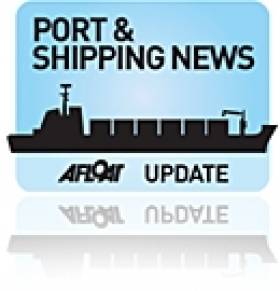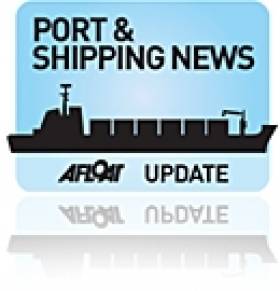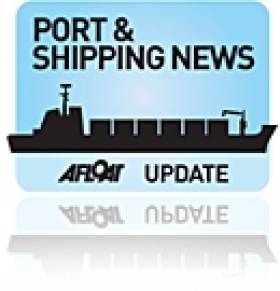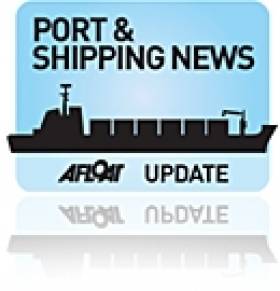Displaying items by tag: Drybulk
Port & Shipping Volumes Continue Slowdown in 3rd Quarter
#PORTS & SHIPPING- The volume of shipping and port traffic through the Republic of Ireland continued to decline during the third quarter of 2011, according to the latest analysis of traffic figures released by the Irish Maritime Development Office (IMDO).
Results from third quarter data indicate that only 1 of the 5 principal freight segments had any growth over the third quarter, while all other segments declined compared to the same period last year as outlined below in the key third quarter data:-
• Lift-on/Lift-off (lo/lo) trades were down 5%
• Roll-on/Roll-off export traffic was down by 2%
• Dry bulk volumes increased by 2%
• Break bulk volumes were down by 3%
• The Tanker/Liquid bulk market was down 7%.
For a more in-depth analysis of each freight-transport mode issued by the IMDO and accompanied by graphic charts click HERE. In addition to compare the 3rd quarter figures with the previous 2nd quater for this year click HERE.
Port and Shipping Volumes Show Second Quarter Slowdown
Below is a list of figures for each transport mode based for the second quarter of 2011.
•Lift-on/Lift-off (lo/lo) trades remained static at 0%.
•Roll-on/Roll-off (ro/ro) export traffic was down by 1%.
•Dry bulk volumes increased by 5%,
•Break bulk volumes were down by 6%
•The Tanker/Liquid bulk market was down 6%.
For more in-depth analysis of each freight-transport mode issued by the IMDO and accompanied by graphic charts click HERE.
Trade, Tonnage and Turnover Up in Belfast Harbour
The principle driver in the ports performance came from the agri-food sector with a record 2m tonnes of grain and animal feed imports. The sector also recorded fertiliser imports alone leap by 32%, reflecting the major investment by the harbour in recent years in the dry-bulk cargo trade.
Roll-on roll-off (Ro-Ro) accounted for a 2% rise to 313,000 vehicles carried, partly due to the introduction of newer larger tonnage on the Belfast-Heysham route.
Belfast Harbour Chairman, Len O'Hagan, said: "Although trading conditions in the UK and Ireland remain weak, the increase in tonnages handled by Belfast Harbour suggests that business confidence is starting to return, albeit slowly.
"Belfast Harbour continues to operate in a highly competitive port sector, but I am pleased to note that the £160m which the Harbour invested in new facilities during the past decade has enabled it to emerge from the downturn with new customers and a presence in new sectors such as renewable energy.
Capital investment in the port worth almost £6m were undertaken during 2010, including the purchase of a new mobile crane, a 10,000 sq ft expansion in logistics space and preliminary works to support the proposed development of an offshore wind turbine terminal for DONG Energy (click HERE). The combined capital expenditure in these projects is in excess of £60m.
Within the ports real estate, projects at the Titanic Quarter progress at the Public Record Office, Belfast Metropolitan College and the core attraction of the 'Titanic Belfast' visitor centre.
Master planning for the 24-acre mixed-use City Quays site adjacent to the Harbour Office was secured. In addition planning permission was lodged for a 230,000 sq ft of space at Sydenham Business Park on the south-eastern fringes of the harbour.
Further upstream closer to the city-centre at the Abercorn Basin, initial work had been completed on a marina where there are more plans for the development of a 250-berth full-service leisure facility.
Next Monday the port's cruise business is to welcome a new cruiseship, the 66,000 tonnes Marina of Oceania Cruises. The 1,250-passenger /800 crew newbuild's arrival to Belfast comes in a year that marks the thirteenth anniversary since the first liner docked in the city. In 2011 over 30 such vessels are due to visit bringing some 50,000 passengers and crew.
- RORO
- Marina
- Port of Belfast
- Titanic
- Belfast Lough
- Belfast Harbour
- Titanic Quarter
- Len O'Hagan
- Belfast Harbour Commissioners
- Cruiseships
- Ports and Shipping News
- Dong Energy
- BelfastHeysham
- Belfast Lough News
- Drybulk
- Abercorn Basin
- Belfast Harbour Chairman Len O'Hagan
- Titanic Belfast
- Marina Oceania Cruises
- Offshore Wind Turbines
- Belfast Metropolitan College
- Sydenham Buinsess Park
- Belfast Harbour real estate
Shipping Volumes Up in First Quarter
First quarterly figures for 2011 show that volumes of shipping and port traffic on the majority of principal sectors grew, according to the Irish Maritime Development Office (IMDO).
The figures below outline a moderate trade volume growth in four out of the five key freight segments: Lift-on/ lift-off (lo-lo), Roll-on/Roll-off (ro-ro),dry-bulk, break-bulk and the tanker/liquid market.
• Total lift-on/ lift-off (lo/lo) trades volumes grew by 3%.
• Roll-on/Roll-off export traffic was also up 2% per cent on an all island basis.
• Dry bulk volumes through ROI ports increased by 21%,
• Breakbulk volumes were also up 25%
• The tanker/liquid market was the only sector to record a decline, down by -12% compared to the same period last year.
For further information about the figures, charts and a summary released from the IMDO click here






























































